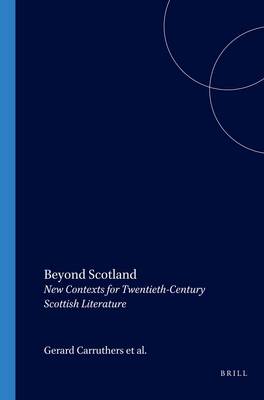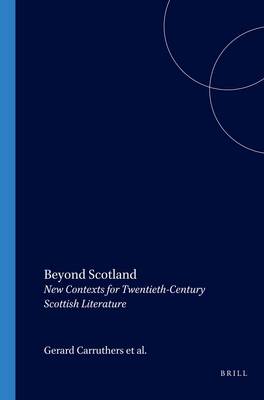
- Afhalen na 1 uur in een winkel met voorraad
- Gratis thuislevering in België vanaf € 30
- Ruim aanbod met 7 miljoen producten
- Afhalen na 1 uur in een winkel met voorraad
- Gratis thuislevering in België vanaf € 30
- Ruim aanbod met 7 miljoen producten
Zoeken
Beyond Scotland
New Contexts for Twentieth-Century Scottish Literature
€ 141,95
+ 283 punten
Omschrijving
Scottish creative writing in the twentieth century was notable for its willingness to explore and absorb the literatures of other times and other nations. From the engagement with Russian literature of Hugh MacDiarmid and Edwin Morgan, through to the interplay with continental literary theory, Scottish writers have proved active participants in a diverse international literary practice. Scottish criticism has, arguably, often been slow in appreciating the full extent of this exchange. Preoccupied with marking out its territory, with identifying an independent and distinctive tradition, Scottish criticism has occasionally blinded itself to the diversity and range of its writers. In stressing the importance of cultural independence, it has tended to overlook the many virtues of interdependence. The essays in this book aim to offer a corrective view. They celebrate the achievement of Scottish writing in the twentieth century by offering a wider basis for appreciation than a narrow idea of 'Scottishness'. Each essay explores an aspect of Scottish writing in an individual foreign perspective; together they provide an enriching account of a national literary practice that has deep, and often surprisingly complex, roots in international culture.
Specificaties
Betrokkenen
- Uitgeverij:
Inhoud
- Aantal bladzijden:
- 268
- Taal:
- Engels
- Reeks:
- Reeksnummer:
- nr. 2
Eigenschappen
- Productcode (EAN):
- 9789042018839
- Verschijningsdatum:
- 1/01/2004
- Uitvoering:
- Paperback
- Formaat:
- Trade paperback (VS)
- Afmetingen:
- 150 mm x 220 mm
- Gewicht:
- 462 g

Alleen bij Standaard Boekhandel
+ 283 punten op je klantenkaart van Standaard Boekhandel
Beoordelingen
We publiceren alleen reviews die voldoen aan de voorwaarden voor reviews. Bekijk onze voorwaarden voor reviews.







